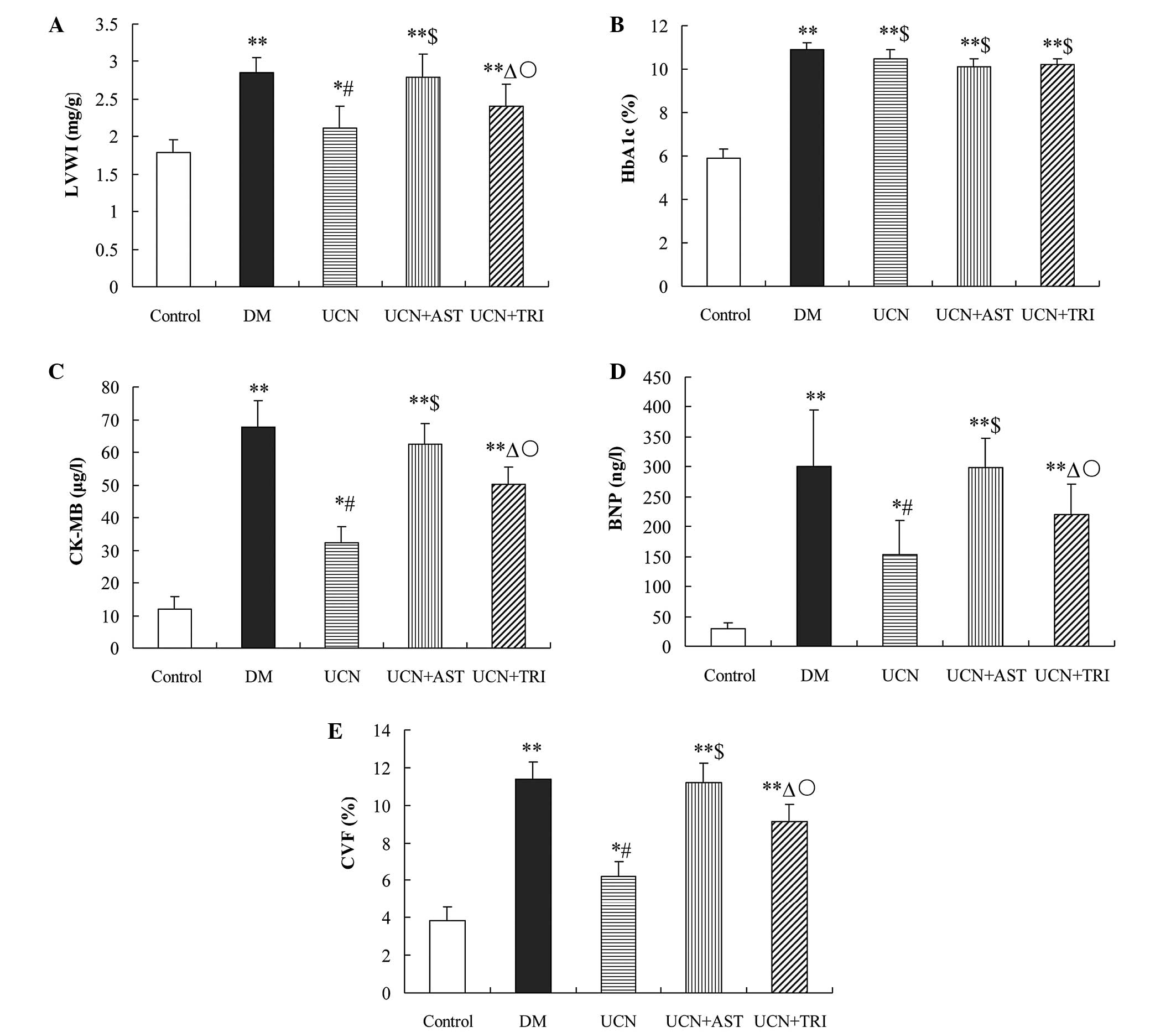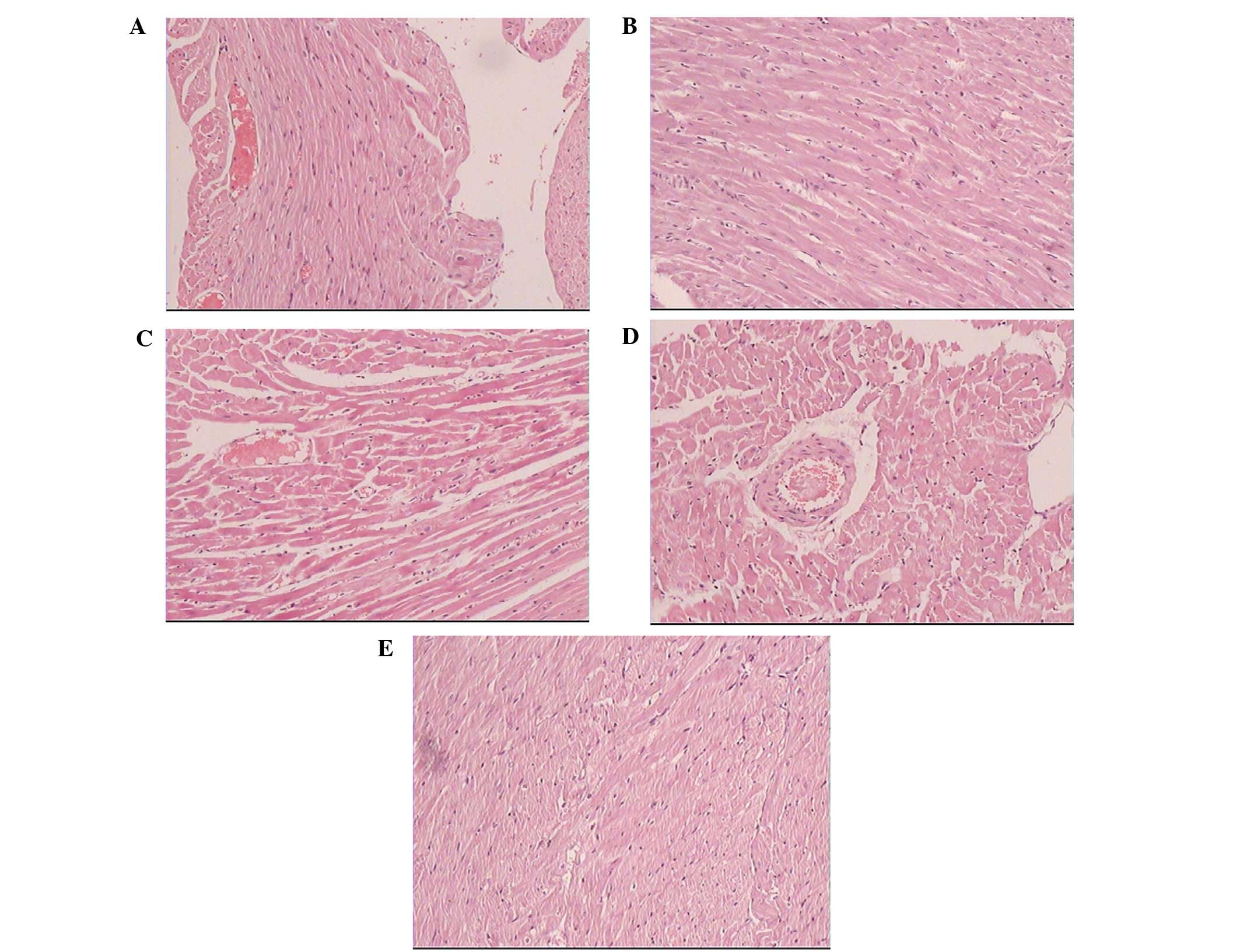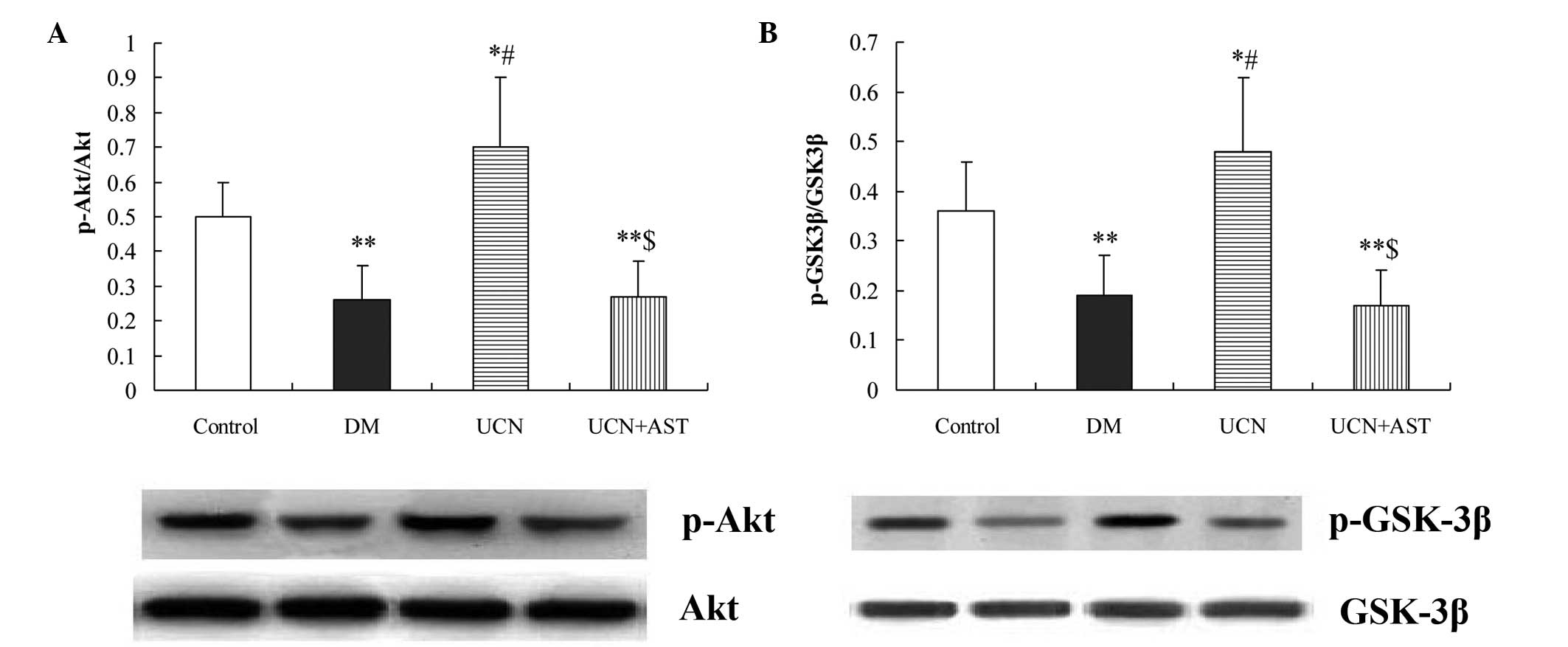|
1
|
Jaffe AS, Spadaro JJ, Schechtman K,
Roberts R, Geltman EM and Sobel BE: Increased conjestive heart
failure after myocardial infarction of modest extent in patients
with diatetes mellitus. Am Heart J. 108:31–37. 1984. View Article : Google Scholar : PubMed/NCBI
|
|
2
|
Falcão-Pires I and Leite-Moreira AF:
Diabetic cardiomyopathy: understanding the molecular and cellular
basis to progress in diagnosis and treatment. Heart Fail Rev.
17:325–344. 2012. View Article : Google Scholar
|
|
3
|
Huynh K, McMullen JR, Julius TL, Tan JW,
Love JE, et al: Cardiac specific IGF-1 receptor transgenic
expression protects against cardiac fibrosis and diastolic
dysfunction in a mouse model of diabetic cardiomyopathy. Diabetes.
59:1512–1520. 2010. View Article : Google Scholar : PubMed/NCBI
|
|
4
|
Fang ZY, Prins JB and Marwick TH: Diabetic
cardiomyopathy: evidence, mechanisms, and therapeutic implications.
Endocr Rev. 25:543–567. 2004. View Article : Google Scholar : PubMed/NCBI
|
|
5
|
Bujak M and Frangogiannis NG: The role of
TGF-beta signaling in myocardial infarction and cardiac remodeling.
Cardiovasc Res. 74:184–195. 2007. View Article : Google Scholar :
|
|
6
|
Dai QM, Lu J and Liu NF: Fluvastatin
attenuates myocardial interstitial fibrosis and cardiac dysfunction
in diabetic rats by inhibiting over-expression of connective tissue
growth factor. Chin Med J (Engl). 124:89–94. 2011.
|
|
7
|
Vaughan J, Donaldson C, Bittencourt J,
Perrin MH, Lewis K, Sutton S, et al: Urocortin, a mammalian
neuropeptide related to fish urotensin I and to
corticotropin-releasing factor. Nature. 378:287–292. 1995.
View Article : Google Scholar : PubMed/NCBI
|
|
8
|
Fekete EM and Zorrilla EP: Physiology,
phamacology, and therapeutic relevance of urocortins in mammals:
ancient CRF paralogs. Front Neuroendocrinol. 28:1–27. 2007.
View Article : Google Scholar
|
|
9
|
Honjo T, Inoue N, Shiraki R, Kobayashi S,
Otsui K, Takahashi M, et al: Endothelial urocortin has potent
antioxidative properties and is upregulated by inflammatory
cytokines and pitavastatin. J Vasc Res. 43:131–138. 2006.
View Article : Google Scholar
|
|
10
|
Huang Y, Chan FL, Lau CW, Tsang SY, He GW,
Chen ZY and Yao X: Urocortin-induced endothelium-dependent
relaxation of rat coronary artery: role of nitric oxide and
K+ channels. Br J Pharmacol. 135:1467–1476. 2002.
View Article : Google Scholar : PubMed/NCBI
|
|
11
|
Takahashi K: Distribution of urocortins
and corticotropin-releasing factor receptors in the cardiovascular
system. Int J Endocrinol. 2012:3952842012. View Article : Google Scholar : PubMed/NCBI
|
|
12
|
Rademaker MT, Charles CJ, Espiner EA,
Frampton CM, Lainchbury JG and Richards AM: Four-day urocortin-I
administration has sustained beneficial haemodynamic, hormonal and
renal effects in experimental heart failure. Eur Heart J.
26:2055–2062. 2005. View Article : Google Scholar : PubMed/NCBI
|
|
13
|
Liu CN, Yang C, Liu XY and Li S: In vivo
protective effects of urocortin on ischemia-reperfusion injury in
rat heart via free radical mechanisms. Can J Physiol Pharmacol.
83:459–465. 2005. View
Article : Google Scholar : PubMed/NCBI
|
|
14
|
Yang C, Xu Y, Mendez T, Wang F, Yang Q and
Li S: Effects of intravenous urocortin on angiotensin-coverting
enzyme in rats. Vascul Pharmacol. 44:238–246. 2006. View Article : Google Scholar : PubMed/NCBI
|
|
15
|
Tarquini R, Lazzeri C, Pala L, Rotella CM
and Gensini GF: The diabetic cardiomyopathy. Acta Diabetol.
48:173–181. 2011. View Article : Google Scholar
|
|
16
|
Ma YX, Li WH and Xie Q: Rosuvastatin
inhibits TGF-beta1 expression and alleviates myocardial fibrosis in
diabetic rats. Pharmazie. 68:355–358. 2013.PubMed/NCBI
|
|
17
|
Umezono T, Toyoda M, Kato M, Miyauchi M,
et al: Glomerular espression of CTGF, TGF-beta 1 and type IV
collagen in diabetic nephropathy. J Nephrol. 19:751–757.
2006.PubMed/NCBI
|
|
18
|
Liu Y, Tanabe K, Baronnier D, Patel S,
Woodgett J, et al: Conditional ablation of GSK-3β in islet beta
cells results in expanded mass and resistance to fat
feeding-induced diabetes in mice. Diabetologia. 53:2600–2610. 2010.
View Article : Google Scholar : PubMed/NCBI
|
|
19
|
Wang Y, Feng W, Xue W, et al: Inactivation
of GSK-3β by metallothionein prevents diabetes-related changes in
cardiac energy metabolism, inflammation, nitrosative damage, and
remodeling. Diabetes. 58:1391–1402. 2009. View Article : Google Scholar : PubMed/NCBI
|
|
20
|
Yu W, Wu J, Cai F, Xiang J, Zha W, et al:
Curcumin alleviates diabetic cardiomyopathy in experimental
diabetic rats. PloS One. 7:e520132012. View Article : Google Scholar : PubMed/NCBI
|
|
21
|
Katare RG, Caporali A, Oikawa A, Meloni M,
et al: Vitamin B1 analog benfotiamine prevents diabetes-induced
diastolic dysfunction and heart failure through Akt/Pim-1-mediated
survival pathway. Circ Heart Fail. 3:294–305. 2010. View Article : Google Scholar : PubMed/NCBI
|
|
22
|
Bale TL, Hoshijima M, Gu Y, et al: The
cardiovascular physiologic actions of urocortin II: acute effects
in murine heart failure. Proc Natl Acad Sci USA. 101:3697–3702.
2004. View Article : Google Scholar : PubMed/NCBI
|
|
23
|
Emeto TI, Moxon JV, Rush C, Woodward L and
Golledge J: Relevance of urocortins to cardiovascular disease. J
Mol Cell Cardiol. 51:299–307. 2011. View Article : Google Scholar : PubMed/NCBI
|
|
24
|
Liew HK, Hsu CW, Wang MJ, et al:
Therapeutic benefit of urocortin in rats with intracerebral
hemorrhage. J Neurosurg. 116:193–200. 2012. View Article : Google Scholar
|
|
25
|
Rademaker MT, Charles CJ, Nicholls G and
Richards M: Urocortin 2 sustains haemodynamic and renal function
during introduction of beta-blockade in experimental heart failure.
J Hypertens. 29:1787–1795. 2011. View Article : Google Scholar : PubMed/NCBI
|
|
26
|
Gruson D, Ginion A, Lause P, Ketelslegers
JM, Thissen JP and Bertrand L: Urotensin II and urocortin trigger
the expression of myostatin, a negative regulator of cardiac
growth, in cardiomyocytes. Peptides. 33:351–353. 2012. View Article : Google Scholar : PubMed/NCBI
|
|
27
|
Rademaker MT, Charles CJ, Nicholls MG and
Richards AM: Interactions of enhanced urocortin 2 and
mineralocorticoid receptor antagonism in experimental heart
failure. Circ Heart Fail. 6:825–832. 2013. View Article : Google Scholar : PubMed/NCBI
|
|
28
|
Parkes DG, Weisinger RS and May CN:
Cardiovascular actions of CRH and urocortin: an update. Peptides.
22:821–827. 2001. View Article : Google Scholar : PubMed/NCBI
|
|
29
|
Miki I, Seya K, Motomura S and Furukawa K:
Role of corticotropin-releasing factor receptor type 2 in
urocortin-induced vasodilation of rat aortas. J Pharmacol Sci.
96:170–176. 2004. View Article : Google Scholar : PubMed/NCBI
|
|
30
|
Brar BK, Jonassen AK, Stephanou A, et al:
Urocortin protects against ischemic and reperfusion injury via a
MAPK-dependent pathway. J Biol Chem. 275:8508–8514. 2000.
View Article : Google Scholar : PubMed/NCBI
|
|
31
|
Rademaker MT, Charles CJ, Ellmers LJ,
Lewis LK, Nicholls MG and Richards AM: Prolonged urocortin 2
administration in experimental heart failure: sustained
hemodynamic, endocrine, and renal effects. Hypertension.
57:1136–1144. 2011. View Article : Google Scholar : PubMed/NCBI
|
|
32
|
Ikeda K, Fujioka K, Manome Y and Tojo K:
Clinical perspectives of urocortin and related agents for the
treatment of cardiovascular disease. Int J Endocrinol.
2012:1986282012. View Article : Google Scholar : PubMed/NCBI
|



















